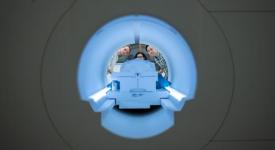Alzheimer’s Drug Fermented With Help From AI and Bacteria Moves Closer to Reality

03/14/2024 - An innovative approach uses artificial intelligence and biosensors to pave the way for faster drug development.

03/14/2024 - An innovative approach uses artificial intelligence and biosensors to pave the way for faster drug development.

02/01/2024 - Researchers from The University of Texas at Austin and McGill University delve into the mathematical intricacies of wire puzzle design. Focusing on geometrical aspects, they establish criteria for puzzle characteristics, emphasizing the importance of a challenging experience. The team introduces quantitative metrics to assess tunnel-bubble structures, demonstrating their effectiveness in distinguishing puzzles from non-puzzles. Their findings provide a foundation for an optimization model, shaping the future of wire puzzle design.

01/25/2024 - The University of Texas at Austin is creating one of the most powerful artificial intelligence hubs in the academic world to lead in research and offer world-class AI infrastructure to a wide range of partners.

11/08/2023 - In mathematical optimization, a new approach is emerging, promising to transform how we tackle intricate challenges across various domains. Consider the complexity of bilevel optimization, a problem that has confounded experts in machine learning, engineering, and other fields. Recent advances are providing new insights into this intricate landscape, presenting a streamlined technique that has the potential to significantly enhance our ability to navigate these complex problems.

11/02/2023 - Smriti Singh spends a lot of time on social media. But, not in the way most students do.

09/27/2023 - The work of researchers from The University of Texas at Austin’s Department of Computer Science in crash consistency has yielded a breakthrough innovation—the Chipmunk system. At its core, Chipmunk zeroes in on a crucial mission—meticulously testing file systems to identify and tackle crash consistency bugs that can significantly impact data integrity and system reliability. The UT Austin team has produced a promising solution that could pave the way for a new era in data storage and stability.

05/01/2023 - The work relies in part on a transformer model, similar to the ones that power ChatGPTA new artificial intelligence system called a semantic decoder can translate a person’s brain activity — while listening to a story or silently imagining telling a story — into a continuous stream of text. The system developed by researchers at The University of Texas at Austin might help people who are mentally conscious yet unable to physically speak, such as those debilitated by strokes, to communicate intelligibly again.

04/21/2023 - UT Computer Science Ph.D. Garrett Bingham’s research under Professor Risto Miikkulainen in smart automated machine learning has made significant steps toward more efficient neural network systems.

04/11/2023 - AUSTIN, Texas — The University of Texas at Austin and Amazon are launching a science and engineering research partnership to enhance understanding in a variety of areas, including video streaming, search and information retrieval and robotics.

03/03/2023 - A methodology developed by UT professors will allow the cost of verifying computations to be reduced by batching many separate arguments together. Brent Waters, a computer science professor and a co-author of the paper, was inspired to find a more efficient way to verify computations by refining techniques that had already come out over a decade ago.